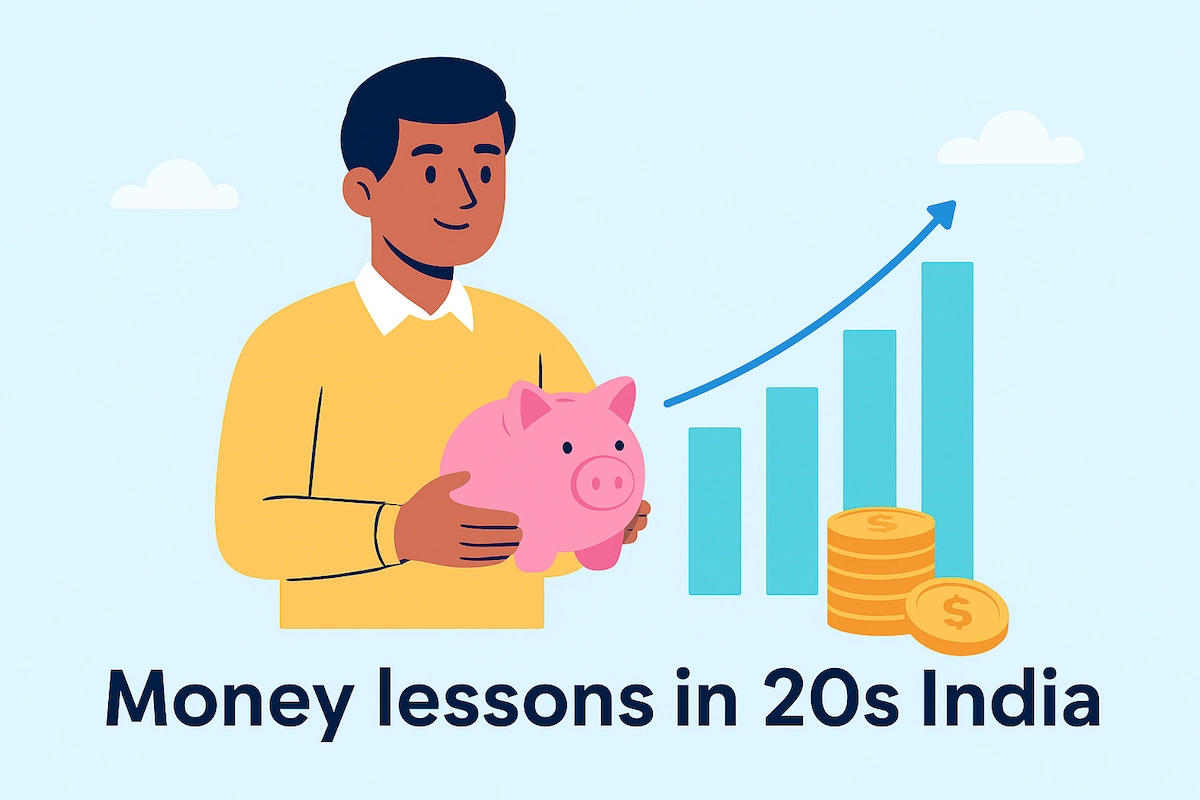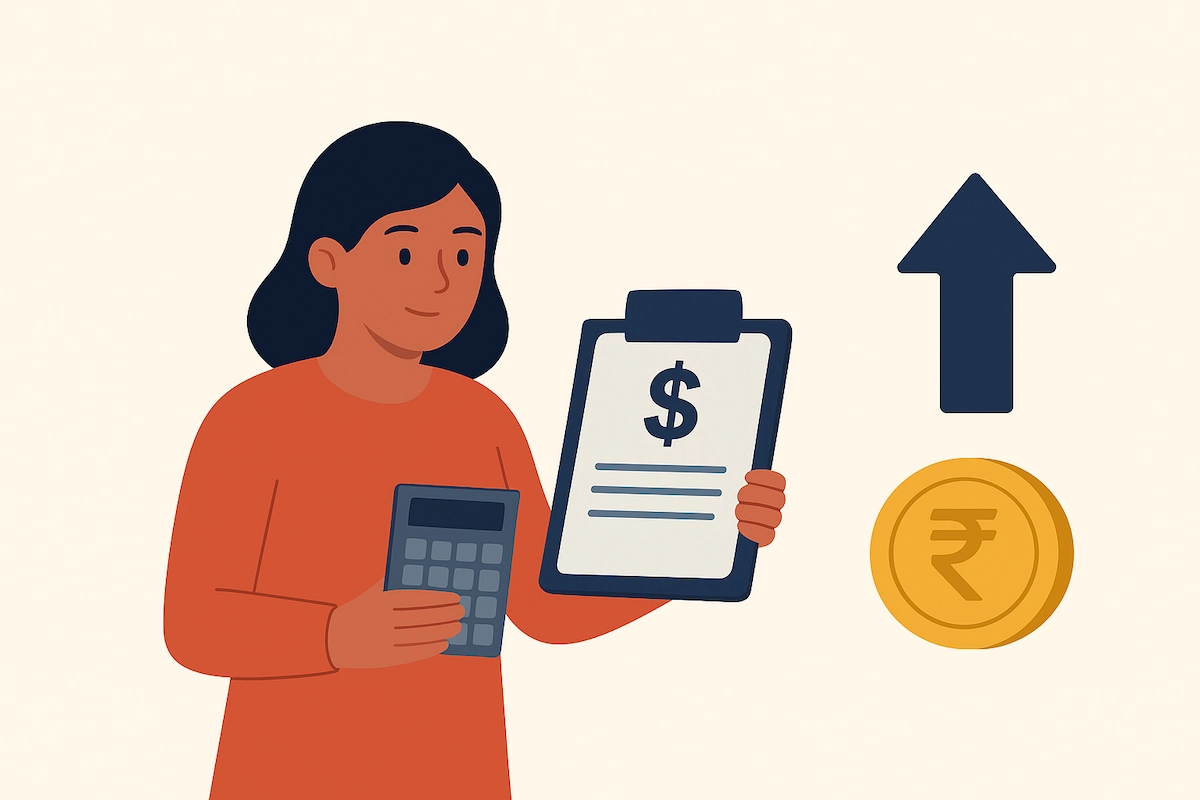Introduction
Money lessons in 20s India are crucial for building a secure financial future. Your 20s are exciting — the first real paycheck, new independence, and big dreams. But they are also the time when most young adults make financial mistakes that take years to fix. I remember my first salary — I spent it all on gadgets and outings, thinking I had time to save later. Spoiler: I didn’t.
Looking back, I realize there were lessons I wish someone had told me — lessons about saving wisely, starting to invest early, and managing money smartly. These are not just tips; they are real-life insights that can help you avoid unnecessary stress and set up a secure financial future.
These 10 money lessons in 20s India are practical, relatable, and actionable. By following them, you can avoid unnecessary stress, start saving and investing early, and set yourself on the right path for long-term financial freedom.

Lesson 1 – Start Saving Early in Your 20s, No Matter How Small
If there’s one thing I regret about my 20s, it’s not saving early. Back then, I kept telling myself, “I’ll save when I start earning more.” But that “later” never really came, and I lost the most valuable advantage you can ever have in money — time.
Even saving as little as ₹500 or ₹1,000 a month can grow into a significant amount over the years, thanks to the power of compounding. I’ll give you an example: if you start saving ₹1,000 a month at 22 and earn around 12% annually, by the time you’re 32, you’ll have more than ₹1.8 lakh. But if you wait ten years to begin, you won’t even touch ₹1 lakh. That’s how powerful starting early really is.
Tip: Don’t complicate things — easily open a separate savings account or start a recurring deposit. Even if it’s a small amount, treat it like a bill you can’t skip. Trust me, your future self will be grateful.

Lesson 2 – Track Every Expense
If you don’t know where your money goes, it’s impossible to save or invest effectively. I used to spend mindlessly on food, subscriptions, and social outings. By the end of the month, I had no idea how my salary had disappeared.
Tracking every expense changed everything. I started using apps like Money View or Walnut — even a few minutes a day can help you see exactly where your money is going. Once I realized how much I was spending on unnecessary subscriptions, I cancelled a few and redirected that money to savings.
Tip: Write down every expense for a month, or use a free app. Seeing your spending in black and white makes you aware, and small changes quickly add up.
Lesson 3 – Avoid Bad Debt Like the Plague
Debt can be tricky. Not all debt is harmful — if managed well, a home loan or education loan can actually be considered good debt. But credit card overspending, personal loans, or payday loans can trap you in a cycle of stress and high interest.
I remember taking a personal loan for a gadget I didn’t really need. The interest accumulated so fast that I ended up paying almost double the original cost. That’s when I learned the hard way: avoid bad debt at all costs.
Tip: Only borrow for things that create long-term value or income, and always pay your credit card balance in full every month. If you can’t, it’s better not to use credit at all.

Lesson 4 – Build an Emergency Fund
Saving regularly is one of the most important money lessons in 20s India to protect yourself from unexpected expenses. Life has a way of surprising us — a sudden medical bill, a job change, or an unexpected repair can come out of nowhere. That’s precisely why an emergency fund isn’t optional; it’s essential. A simple rule of thumb is to save at least 3 to 6 months’ worth of your living expenses as a safety net.
I learned this lesson the hard way. One unexpected car repair drained my savings completely, and I had nothing to fall back on. From that day, I made it a habit to set aside even a small amount each month in a separate savings account. Slowly but surely, it gave me peace of mind knowing that I could handle emergencies without panicking.
Tip: Don’t wait to start big. Begin with as little as ₹500–₹1,000 a month in a recurring deposit or liquid fund. Over time, it grows — and what truly matters is staying consistent, not the amount you start with.
Lesson 5 – Start Investing Early in Your 20s for a Secure Future
Starting SIPs early is a key step in following smart money lessons in 20s India. Even small monthly investments grow significantly over time due to compounding.
I wish I had started investing in SIPs or mutual funds at 22. By the time I started at 27, I had already missed out on several lakhs in potential returns.
Tip: Start with simple SIP investments in mutual funds, or even index funds. Don’t wait to have a big salary — start with whatever you can, even ₹500 per month. The key is consistency, not amount.

To learn more about SIPs and mutual funds in India, visit SEBI Mutual Fund Basics
Lesson 6 – Don’t Compare Yourself with Others
It’s so easy to get caught up in what we see on social media — friends buying cars, going on trips, or moving into fancy apartments. I remember spending months stressing over keeping up with everyone else, thinking I was falling behind.
But here’s the truth: your financial journey is entirely your own. Constantly comparing yourself to others doesn’t help — it only adds stress and can push you toward bad money decisions, like taking unnecessary loans or overspending to keep up with others.
Tip: Keep your focus on your own goals, savings, and growth. Celebrate the small wins along the way, whether it’s saving your first ₹10,000 or starting your first SIP. Those small victories, compounded over time, matter far more than trying to match someone else’s lifestyle.
Lesson 7 – Learn About Taxes Early
Understanding tax deductions is another essential money lessons in 20s India for young adults. Learning about income tax slabs, deductions, and exemptions is essential.
I ignored taxes when I started working. Filing my first return at 25 was stressful because I had no clue about the deductions I could claim. Later, I realized platforms like ClearTax or H&R Block make it easy for beginners.
Tip: Keep track of all income, investments, and expenses eligible for deductions. Even small claims for insurance or education can reduce your taxable income.
You can easily file your returns and check deductions using ClearTax India.
Lesson 8 – Have a Side Income
Relying on just one source of income can be risky. A side hustle not only adds extra money to your pocket but also helps you develop valuable skills and boosts your confidence.
I personally started freelancing online while keeping my full-time job. The additional income helped me save my first ₹1 lakh much faster than I ever expected. Even better, it gave me the freedom to own my time and enjoy a true sense of independence.
Tip: Look for opportunities that match your skills — freelancing, content writing, teaching, or even passive income options like YouTube or blogging. Small efforts today can grow into substantial income tomorrow.

Lesson 9 – Invest in Yourself
Your best investment is always in yourself — skills, education, and health. In my early 20s, I neglected learning new skills, thinking I could catch up later. The delay cost me promotions and income opportunities.
Tip: Invest time in learning high-value skills, taking online courses, or even focusing on improving your health and fitness. Investing in yourself often gives a much higher return than most financial assets.
Lesson 10 – Plan for Big Life Goals Early
Planning for big life goals is one of the crucial money lessons in 20s India everyone should follow. Marriage, buying a house, and travel — these are significant goals that require planning and budgeting early. I started late and felt stressed juggling loans, wedding expenses, and personal savings.
Tip: Break big goals into small achievable steps. Even saving a small amount monthly for travel or your dream home creates momentum. Early planning reduces stress and gives you control over your life.
For guidance on personal finance planning, you can refer to RBI Personal Finance Tips
Conclusion
Your 20s are the foundation of your financial future. By applying these money lessons in 20s India, you can avoid mistakes, reduce stress, and build a secure future. Remember, it’s not about earning more immediately — it’s about smart habits, saving consistently, investing wisely, and planning ahead.
Start small, stay consistent, and your future self will thank you. Begin applying these money lessons in 20s India today and take control of your finances!

Start your first ₹500 savings today, track every expense, or open a beginner SIP — even small steps today secure your financial tomorrow.


